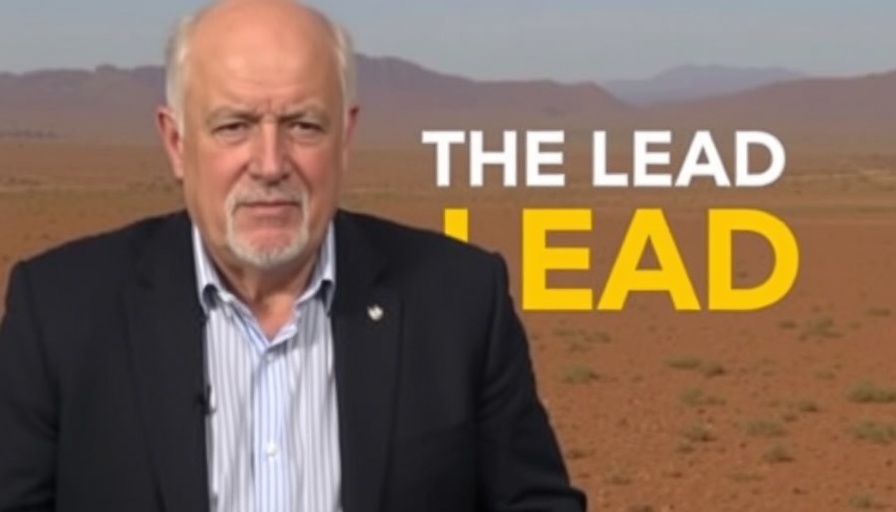
The Hidden Costs of Wealth: Diamonds and Their Blood
The recent podcast episode featuring Jacques Pauw dives deep into the tumultuous history of diamond mining in Namaqualand, highlighting an ongoing struggle marked by conflict and exploitation. As the world clamors for these precious stones, the sordid activities that accompany their extraction remain obscured, raising questions about the ethical implications for consumers and investors alike. The bloody diamond wars have not only left physical scars on the land but have also impacted communities, drawing attention to critical issues like economic recovery, corruption investigations, and the dynamics of South African politics.
A Legacy of Exploitation: The Historical Context of Diamond Mining
Mining in Namaqualand has a storied past, with roots tracing back to the discovery of diamonds in the region in the late 19th century. This era not only enriched foreign investors but also led to the marginalization of local communities who were displaced and affected by mining operations. Today, this legacy of exploitation continues as mining companies often prioritize profit over the wellbeing of the surrounding communities. Exploring the historical context provides a clearer understanding of how present-day challenges, including social unrest and economic inequality, are intrinsically linked to the diamond trade.
The Importance of Accountability in Corporate Practices
In exposing the realities of diamond mining, Pauw stresses the dire need for accountability within corporate structures. The norms of transparency are pivotal for ensuring that local businesses and communities benefit from natural resources rather than suffer the consequences of corruption and mismanagement. By advocating for stricter regulations, the podcast underscores the broader demand for responsible governance across South Africa, especially in light of the ongoing investigations into state capture and the pervasive corruption scandals that have plagued various sectors, including mining.
Connecting with the Present: Unemployment and Crime Statistics
The podcast does not shy away from the present-day implications of the diamond wars, particularly concerning unemployment rates and crime statistics, which have surged in response to social and economic instability. As political tensions escalate, with the ANC facing challenges from opposition parties such as the Democratic Alliance and the EFF, these issues have become increasingly intertwined. The struggles of affected communities are indicative of broader national dilemmas—where economic disenfranchisement can lead to civil unrest and public sector strikes, further straining local resources.
The Future Outlook: Reform and Recovery in South Africa
While the podcast paints a grim picture of the past and present, it also hints at a potential path forward through reform and recovery. Discussions around land reform, government policies aimed at boosting economic resilience, and special measures for communities affected by diamond mining are critical. As South Africa grapples with climate change and its repercussions on agriculture and food security, the mining industry must adapt to a new reality where sustainable practices take precedence.
What You Can Do: Engage with Social Responsibility
As listeners engage with this potent narrative, there arises a strong incentive to reflect on their roles as consumers. Understanding the source of these diamonds and advocating for ethical purchasing decisions can spark much-needed change within the industry. Supporting initiatives that aim to uplift communities affected by mining not only promotes social responsibility but may also influence larger economic policies that prioritize equitable distribution of wealth.
Reflecting on Human Rights: A Broader Conversation
This podcast opens a vital conversation regarding human rights issues entrenched in the diamond supply chain. It prompts members of society, particularly professionals tuned into South African politics, to consider how their purchasing habits intersect with access to rights and justice. The discussion is not merely one of minerals and money but is inextricably linked to the fight for racial equality, gender-based violence prevention, and overall human dignity in the extraction economies.
In conclusion, Pauw's investigation into the bloody diamond war in Namaqualand serves as a wake-up call for those engaged in discussions around economic recovery, state policy, and ethical consumption. It urges all stakeholders—from policymakers to consumers—to actively participate in discussions that could transform the diamond industry from one notorious for exploitation to one pursuing social justice and sustainability. As we navigate these complex issues, let us empower ourselves with knowledge and take actionable steps toward promoting transparency and accountability in industries that often go unchecked.
 Add Row
Add Row  Add
Add 




Write A Comment